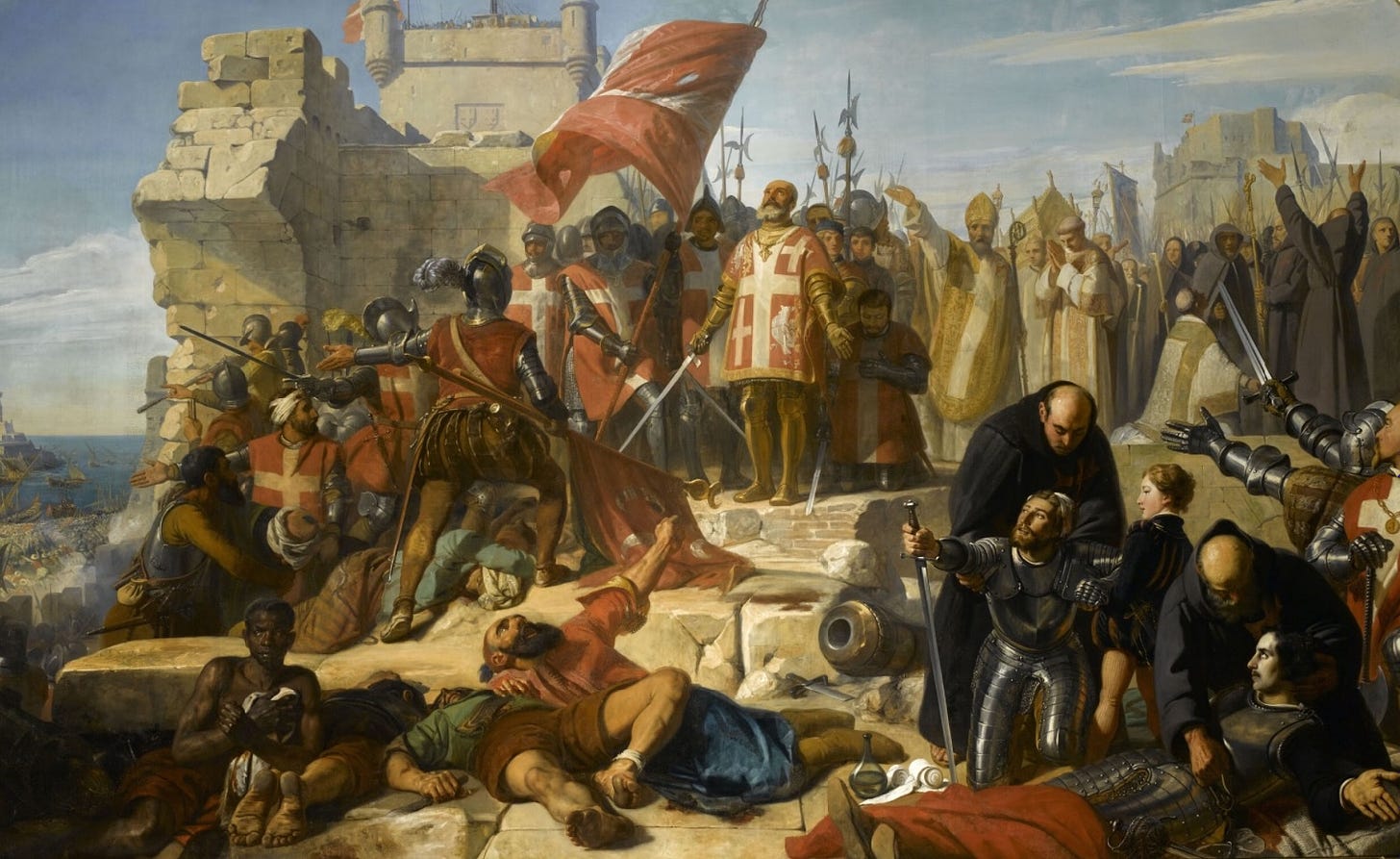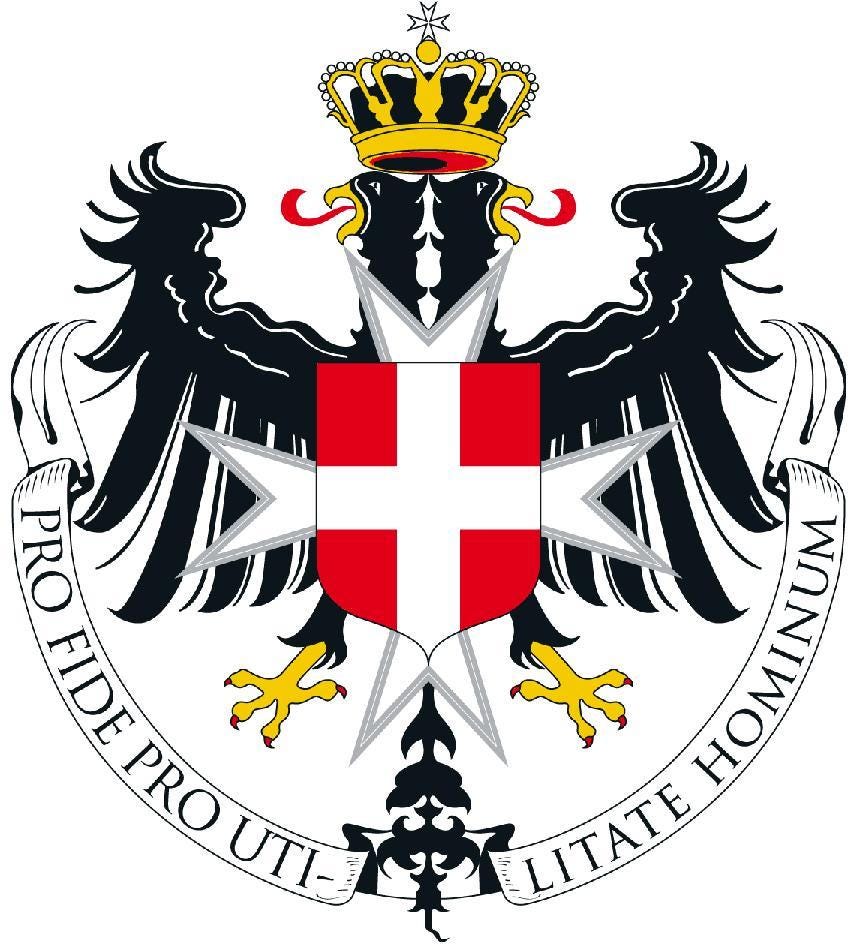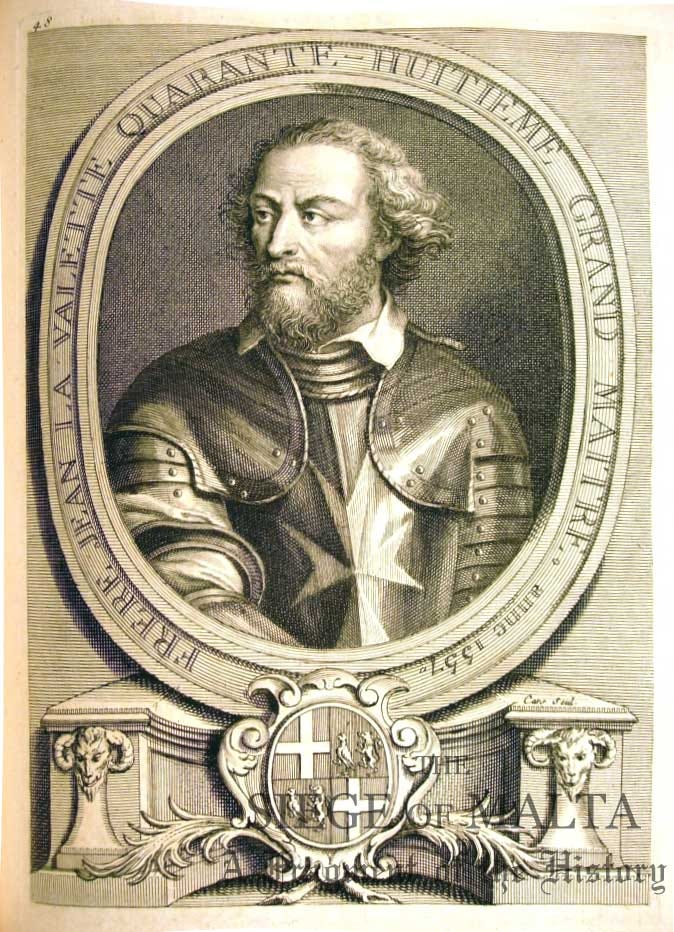All Hail The Men Who Saved Christendom At Malta: The Knights of St John
This June as the demonic "celebrate pride" let us honor & endeavor to live up to the men who gave their lives to defend Christianity
In June of 1565, heroic men of Christendom began the battles that ultimately lead to the end of the Ottoman Empire’s attempt to replace Christianity with the muslim Caliphate. The battle of San Angelo on Malta island had begun on the 24th of May but it was the miraculous courage of the Knights of St John, in the month of June, that held back the anti-Christian fury of 30,000+ Ottoman janissaries, thwarting Mustapha Pacha’s attempt to gain Malta for Suleman the Magnificent’s empire.
It is fitting that June is the month of The Sacred Heart of Our Lord and the month where the feast of St John The Baptist will be celebrated. St John literally gave his head for the defense of Christian marriage. 1540 years later, the Christian Knights, following in the example of The CRUSADERS, would defend Malta and later confront Mustafa Mohammed at LePanto. Today nearly all the men of former Christendom will “celebrate” or fail to oppose the demonic inversion of Christianity that “pride month” promotes.
Puh-frikkin-lease.
In 2015 I put back into print and recorded an audio book version of a work that detailed this heroic tale, written by a liege of Grandmaster Jean de La Vallette and titled “The Siege of Malta-A Fragment of The History” written by “A Knight of the Renovated Order.” I am enclosing an audio and written preview of the work that you can download or stream online at CRUSADE Max, here. Perhaps it may inspire men of New Christendom to once again stand and wage their lives for The Faith.
The Ottoman fleet appeared off the coast of Malta on the 10th of May. In spite of the efforts of Copier, they landed in one of the smaller havens of the is- land. In one of the skirmishes which took place, the gallant Chevalier de la Riviere was captured and brought before Mustapha, who regarded his noble deportment as a species of bravado and had him put to a cruel torture. The Chevalier affected to be overcome by the severity of his torments, and in answer to the Pacha’s questions told him that the post of Castille and over the Bourg was the weakest part of the fortifications. The Pacha must have had an idea of the deception practised on him; since Suliman had sent engineers, disguised as fisher- men, to Malta, while the expedition was preparing, who, under pretence of fishing in the ditches, and afterwards selling their fish in the city, had taken pretty exact plans of the place. Nevertheless the severity of the torture to which the prisoner had been subjected, made Mustapha inclined to trust the veracity of La Riviere, who, loaded with irons, was taken on board one of the galleys. The fleet anchored in the Port of Marsa Syroc, on the south east of the Island, where two redoubts were erected by the Turks to protect the harbour. The General with the army advanced upon the Bourg and forts, which he reconnoitred from the summit of Mount Calcara, whence almost the entire Island could be seen. There La Riviere was brought; and the Pacha being convinced, by the evidence of his eyes, of the falsehood of the confession, he was beaten to death in the presence of this savage warrior.
A grand council of war was held the day after, when, contrary to the opinion of Piali, who wished nothing to be undertaken without the advice of To r g h u d Pacha, who was daily expected, it was re- solved to lay siege to St. Elmo. The reason given for this by Mustapha, was the prospect of coming suc- cour, and the necessity of acquiring a harbour of greater security for the galleys. On the advance of the Turks, after some severe skirmishes, in which about one thousand five hundred of the enemy were slain, the Marshal Copier and his troops were withdrawn into the forts, and the siege of St. Elmo was regularly commenced. The Turks laboured at their trenches with incredible energy, the fleet fur- nished a vast number of slaves, who were made to work as pioneers, and although the want of soil was a great obstacle to their labours, they succeeded at length, partly by constructing parapets, partly by means of trenches, in securing their working par- ties from the fire of the place.
On the 24th of May they opened a battery of ten twenty-four-pounders, and soon added new batter- ies of guns, carrying sixty, and even one hundred and sixty, and three hundred pound stone balls. The situation of St. Elmo became desperate, and the Grand Master, knowing of how much importance it was to protract the defence, would have even himself conducted succour to the fort, but he was dissuaded by the Chevaliers. Other assistance was sent across the great port, and those who perished were replaced by incessant supplies of volunteers, English, French, Flemish, and German, who, as they arrived in parties from their respective coun- tries at Malta, solicited permission from the Grand Master to repair to St. Elmo as to a post of honour. Uludschali arrived with six galleys from Alexandria to reinforce the Ottomans, and on the 2nd of June came Torghud with thirteen galleys and ten gal- liots, carrying, independently of the crews, above two thousand one hundred choice soldiers. This redoubtable chief, who was considered the best en- gineer of his day at the attack of strong places, con- demned the attack on St. Elmo, but recommend- ed, as it was begun, that it should be carried out. He displayed the utmost zeal and ability, spending whole days in the trenches and batteries, and erect- ing new works to annoy the besieged. At length, af- ter various assaults, he was reconnoitring, along with the Seraskier, previous to a formidable one, when he was struck on the head by a fragment of stone driven off by a ball from the castle of St. An- gelo. The blood gushed from his nose and ears, and he fell to the ground. Mustapha Pacha had a cloak thrown over the wounded hero, while he himself took the place of Torghud and continued the recon- noissance. The almost constant fire from the sea and the land, and the repetition of furious assaults, at length exhausted the strength, and for a moment the energy of the besieged. They represented to the Grand Master that the outworks of the fort hav- ing fallen, and the breaches being practicable, the place was no longer tenable. La Valette replied that it must be defended to the last extremity, in order to give time for the arrival of the Sicilian succours, and he offered to send fresh troops to take the place of the defenders. This reply stung these brave men, who determined to die at their post. All prospect of succour was soon after cut off by the prolongation of the Turkish works to the borders and sides of the great port, and, the approach of their galleys to its mouth…







